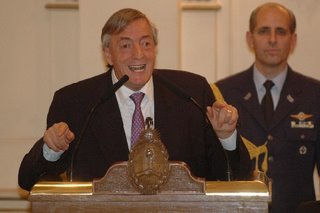Ink Battles
Of late, however, the media has been highly critical of the administration’s attempt to push through “superpowers of urgency,” which, as I understand poorly, are like a line-item veto on steroids. (A better explanation is both solicited and welcome.)
Yesterday President Kirchner gave a speech in which he blasted journalists for “lobbying” instead of reporting, failing to check facts, and hurting the his feelings: “¡Qué pena que me dan!” he exlaimed.

The news on news made the front page of both La Nación and Clarín, the capital’s two biggest dailies.
Journalists were predictably indignant and furnished La Nación with enough blurbs for an article that bears the headline “The Press’s Unanimous Rejection of the Attacks of the President and his Wife.” Cristina Kirchner, incidentally, is a Senator.
The comparisons to Perón and Evita were perhaps inevitable, but columnist Pepe Eliaschev went way back, claiming, “The intelectual hero of this government is Juan Manuel de Rosas, the synthesis of the sum of public power.”
 Rosas, dictator of Argentina from 1829-52, was indeed endowed with absolute powers from 1835 until the end of his reign. The notion of him as an intellectual hero, however, is highly ironic: as a pro-Rosas poem published in 1830 has it, Rosas has little respect for abstract thinking:
Rosas, dictator of Argentina from 1829-52, was indeed endowed with absolute powers from 1835 until the end of his reign. The notion of him as an intellectual hero, however, is highly ironic: as a pro-Rosas poem published in 1830 has it, Rosas has little respect for abstract thinking:“Of these wise men of the Earth,
Good opinion I don't got...
They're gonna confuse us
with their goddam theories.”
(My translation is intentionally coarse and is meant to be read aloud with a Texan accent that masks an Andover and Yale education.)
What’s more, Rosas himself was personally involved in the editing of the Archivo Americano, a trilingual newspaper that was intended to export a good image of the dictator and his government.
So maybe Kirchner should stop whining and pick up a pen. Of course, then Eliaschev’s blustering would have real substance.



1 Comments:
Hi friend! You instruct me about my country history and present.
kisses
la hereje
Post a Comment
<< Home